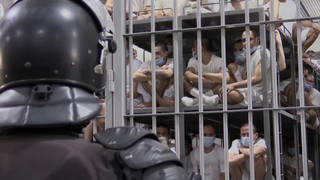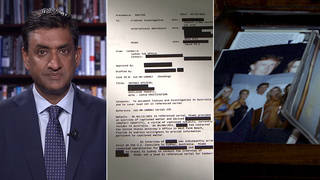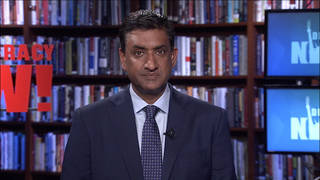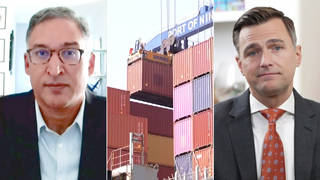
President Donald Trump is standing by his August 1 deadline for other countries to reach new trade agreements with the United States or face steep new tariffs on their exports. The administration has announced a slew of deals, including with the U.K., Japan and the European Union, even as Trump has issued new tariff threats against India, Brazil and others.
“You’ve got total, random chaos,” says policy expert Lori Wallach, director of the Rethink Trade program at the American Economic Liberties Project and host of the podcast Rethinking Trade with Lori Wallach. “What the Trump administration is doing, basically, is an abuse of the tariff tool … to threaten countries based on foreign policy whims.”
Transcript
AMY GOODMAN: I’m Amy Goodman, with Nermeen Shaikh. This is Democracy Now!
NERMEEN SHAIKH: We turn now to trade. President Trump is standing by his August 1st deadline for trading partners to reach new trade agreements with the United States or face steep new country-specific tariffs. He posted on social media, quote, ”THE AUGUST FIRST DEADLINE IS THE AUGUST” — a trade deal with South Korea was also announced.
AMY GOODMAN: We turn now to Lori Wallach. Lori Wallach is the director of Rethink Trade, part of the American Economic Liberties Project. She’s a board member of the Citizens Trade Campaign.
Thanks so much for joining us, Lori. I mean, there is so much happening leading up to this August 1st deadline. Can you talk about what’s most significant, the trade deals that are threatened, the ones that are being torn apart, the ones that are being reached between Trump and, for example, South Korea, now saying he’s reconsidering Canada because they’re considering a Palestinian state? What should we understand here?
LORI WALLACH: I think the biggest takeaway is that what is actually being done by the president, Donald Trump, is the opposite of what candidate Donald Trump promised, to attract working-class voters, which was using tariffs and trade policy to rebalance trade, to rebuild our manufacturing, to create good jobs, making the things we need to be safe here at home. None of that is what’s happening.
Instead, first of all, you’ve got total, random chaos. It’s on, it’s off. That’s actually chilling investment. So, some of the factories, new factories, that were being constructed under the previous administration, the construction has been chilled, because businesses have no idea what next week is going to be his whim.
Number two, you’re seeing this horrible combination of sort of Trump’s own personal flattery, grudges, whims and kind of like the George W. Trump administration, as far as these deals, which are not written down, are unclear how real they are. But to the extent he’s touting them, what we know about them is that, for instance, the big demands, the priorities are: for Big Tech, to get rid of other countries’ anti-monopoly rules or privacy policies; for Big Pharma, to raise medicine prices; for Big Oil, to buy more U.S. carbon-based fuels. Meanwhile, on the actual trade front, we see the administration actually starting to cave in on the preexisting Biden-era trade policies on China, because Trump so wants to have actually a summit meeting with the president of China and be flattered there.
And then, the places he is putting in tariffs — you mentioned this — the tariffs in Brazil actually went into effect yesterday, the highest tariffs we have, 50%. Why? Brazil, we have a trade surplus with. We export more stuff to them than we buy. This is not the country you’d want to be hitting with trade sanctions if you’re trying to balance trade and build manufacturing. No, it’s for what you said, because President Trump sees failed coupster, Jair Bolsonaro, the former president, getting some justice in the courts, and wants to beat on what could happen to him in the future, for instance.
Or you heard a big announcement about new trade deals with the Europeans, with Japan, with Korea. That would roll back existing tariffs of 25% on imported vehicles, vehicles that we do know have a very low-wage supply chain. Each of those countries’ other supply chain partners have low wages — Bulgaria for Europe; Southeast Asia, Cambodia, Vietnam for Japan; etc. Instead of conditioning dropping tariffs from the existing — we have 25% tariffs, and some of this was during Biden, on imported autos — they dropped them to 15% — bad for domestic auto production, extract no higher wages, no labor rights. And here’s the kicker, Amy: They have actually 25% tariffs on imported cars from North America, the one agreement that has enforceable labor standards.
NERMEEN SHAIKH: Well, let’s go, in fact, to the statement that the United Auto Workers released after the U.S. trade deal with Japan was announced. In a strongly worded statement, they wrote, quote, “The UAW is deeply angered by the Trump administration’s announced trade deal with Japan. What we’ve seen so far makes one thing clear: American workers are once again being left behind.” They go on to say, quote, “This deal hands a win to transnational automakers that rely on low-road labor practices: substandard wages, excessive temps, and union-busting. … We need trade deals that raise standards — not reward the race to the bottom. This deal does the opposite,” the UAW wrote. So, if you could respond to that, Lori? And also, I want to ask you about the piece that you wrote earlier this year for The American Prospect, in which you talked about the trade deals that we need. If you could — if you could say something about that?
LORI WALLACH: So, the UAW is spot-on right, and they were reacting particularly to the trade agreement — “agreement” — announced with Japan. But the exact same terms have just been hatched with the European Union and also with Korea. Those three trading partners are — they comprise the vast majority of what is an enormous U.S. trade deficit: automobiles and auto parts. So, that actually is an area where there is a legitimate trade action, under a statute called Section 232, to try and actually fix that. So, Trump has rolled that back, the existing penalty for trade cheating.
And then, the agreements he’s made — so, the UAW is spot-on right. The agreements he’s making is using the leverage of those tariffs that he has put in place, or threatened to put in place, to extract goodies for the usual Republican big corporate constituencies. That has nothing to do with rebuilding jobs here or rebuilding our resilience by strengthening our manufacturing sector. And in the article that you can see in The American Prospect or on our website, RethinkTrade.org, where we also have a tool that folks at home can use to test each of these agreements, where we basically have an assessor, an evaluator, so you can see: Here are the things that would be in a good agreement. These are things we need. This would help manufacturing, help balance trade, help U.S. workers, help workers around the world, versus here is stuff that is not in our interest — by the way, cheat. The stuff that’s not in our interest has been the center of these agreements.
What we need is trade policy being used in combination with other industrial policies, so that we do need to rebalance trade. We have a trillion-dollar trade deficit. As is a prediction of economic theory, that has deindustrialized us. We can’t make, as we saw during COVID, the basic things we need just to keep our families safe. In an era of climate chaos, we can’t have everything made in one place and schlepped across the world, dumping carbon fuels. We need to diversify and have redundancy in production. All of those are policies that trade and tariffs can be a part of, but a lot of other tools have to be put in place to actually get the outcomes that you want. And what the Trump administration is doing, basically, is an abuse of the tariff tool. It’s not using it for the kind of outcomes that could be strategic, but then using tariffs to threaten countries based on foreign policy whims, based on a particular flattery goal.
AMY GOODMAN: Lori, Trump keeps saying we’re imposing this tariff on another country. What? Fifty percent, Brazil, whatever. Who actually pays? He suggests it’s the country that’s going to pay, but, in fact, isn’t it a tax on American consumers? And also, talk about small businesses in this country right now falling apart.
LORI WALLACH: OK, so, here is the thing about the tariffs, which is, it is the case that who pays is typically negotiated. So, the neoliberal line of “it’s just a tax, it always gets passed on the consumers,” is not right. Trump’s line of “the other country is paying” is not right. The true answer is it depends.
And what data is showing, Amy, from the beginning of the imposition of these tariffs, is that right now a lot of the foreign companies, to try and keep the U.S. business, because we do have a $1 trillion trade deficit — the whole world is overly reliant on dumping their stuff in this country — a lot of the other countries’ companies are actually either splitting the costs with the U.S. companies or are eating the costs to be able to keep the market. So, we have seen some real price gouging, where U.S. companies are raising prices, but in a lot of those instances, the actual price of the tariff, the cost, has already been absorbed by the company that’s selling this stuff. So, the U.S. companies are price gouging and ripping us off, but they’re not necessarily doing that to pay for the tariff.
So, it depends on what the negotiated outcome is. Practically, the tariff is paid when it comes to the U.S. It goes into the U.S. Treasury. But who actually foots that bill is negotiated. And so far, it’s been a lot of the companies in the other countries. It’s never the other governments, though. Trump is wrong about that. And as far as, you know, what —
AMY GOODMAN: We have 20 seconds.
LORI WALLACH: As far as what we ought to do going forward — so, Trump is not using trade policy in a way to help American workers to raise standards. That needs to be the goal. What we need to do is actually track the actual outcomes and hold them accountable, because, politically, it’s super important. And again, our website at Rethink Trade has an evaluator everyone can use to test these agreements as they come out.
AMY GOODMAN: Lori Wallach, director of the Rethink Trade program at the American Economic Liberties Project, board member of Citizens Trade Campaign, host of Rethinking Trade podcast. That does it for our show. I’m Amy Goodman, with Nermeen Shaikh. This is_Democracy Now!_












Media Options